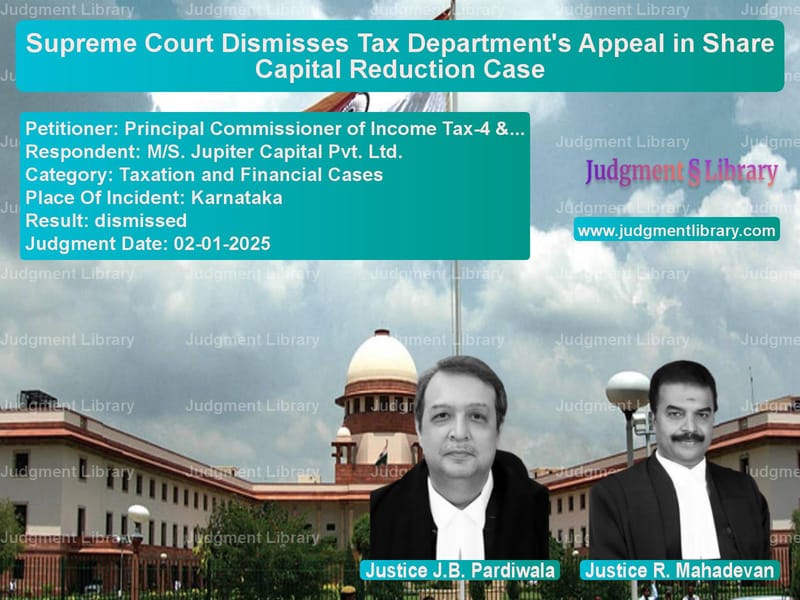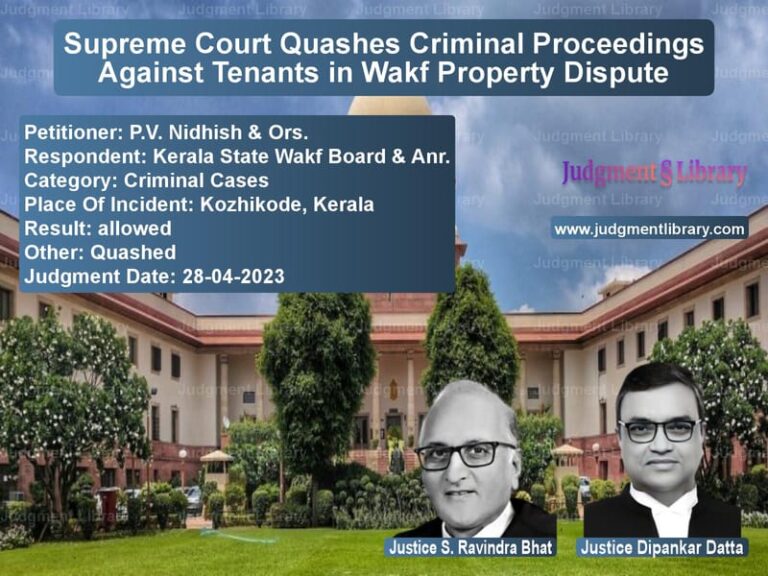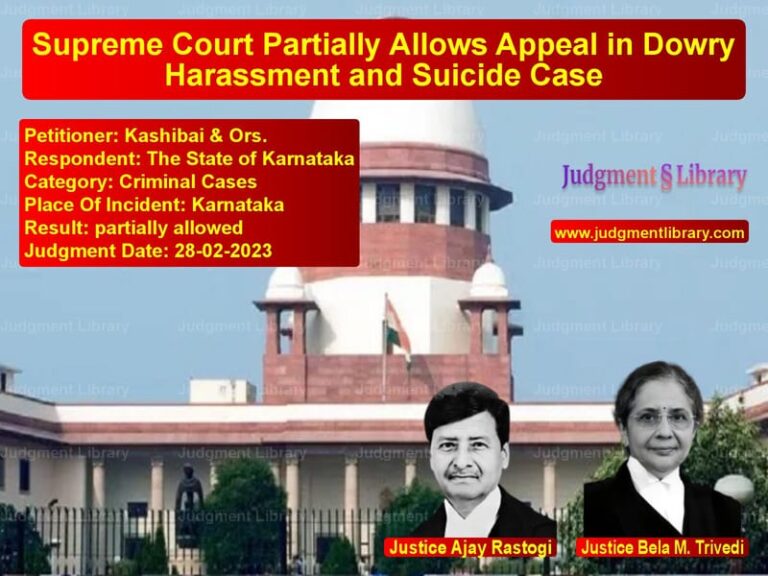Supreme Court Dismisses Tax Department’s Appeal in Share Capital Reduction Case
The Supreme Court of India, in Principal Commissioner of Income Tax-4 & Anr. v. M/S. Jupiter Capital Pvt. Ltd., ruled in favor of the taxpayer, dismissing the Revenue’s appeal regarding capital loss claims on share capital reduction. The Court reaffirmed that the reduction in shareholding due to a court-sanctioned capital restructuring qualifies as a ‘transfer’ under Section 2(47) of the Income Tax Act, 1961.
Background of the Case
The case arose from a dispute over whether the reduction of shares due to a capital restructuring could be considered a ‘transfer’ of a capital asset, thereby allowing the taxpayer to claim long-term capital loss.
Key Facts
- M/S. Jupiter Capital Pvt. Ltd. invested in Asianet News Network Pvt. Ltd. by purchasing 14,95,44,130 shares of ₹10 each.
- Subsequently, the taxpayer acquired additional shares, increasing its total holding to 15,33,40,900 shares (99.88% of the company).
- The company suffered financial losses, leading to a restructuring proposal to set off losses against the paid-up share capital.
- The Bombay High Court approved the capital reduction scheme, reducing the total shares from 15,35,05,750 to 10,000.
- The taxpayer’s shareholding was proportionally reduced to 9,988 shares.
- Despite the reduction, the face value per share remained at ₹10.
- The company compensated the taxpayer ₹3,17,83,474 as part of the restructuring.
Legal Issues
Revenue’s Arguments
The Income Tax Department contended that:
- There was no ‘transfer’ of a capital asset, as required under Section 2(47) of the Income Tax Act.
- The taxpayer continued to hold the same percentage of shares in the company.
- The face value of the shares remained unchanged, indicating no real extinguishment of rights.
- The reduction in the number of shares alone did not amount to a transfer.
Taxpayer’s Arguments
M/S. Jupiter Capital Pvt. Ltd. argued that:
- The restructuring involved an actual reduction in shares held.
- The taxpayer’s total ownership in terms of absolute shares was significantly reduced.
- The payment received constituted consideration for the reduction.
- Under precedents set by Kartikeya V. Sarabhai v. Commissioner of Income Tax, the reduction amounted to a transfer.
Supreme Court’s Observations
1. Definition of ‘Transfer’ Under Section 2(47)
The Court analyzed the definition of ‘transfer’ and emphasized that a reduction of shareholding, even without a change in face value, constitutes an extinguishment of rights.
- “Section 2(47) includes the relinquishment of an asset or extinguishment of any rights therein as a transfer.”
- “The taxpayer’s absolute shareholding was reduced, which qualifies as a transfer.”
2. Impact of Capital Reduction on Shareholder Rights
The Court noted that despite maintaining the percentage of ownership, the taxpayer lost significant voting power and economic value.
- “Reduction in shares diminishes the holder’s proportional stake in the company’s capital.”
- “The compensation received is sufficient evidence of the extinguishment of rights.”
3. Precedents in Similar Cases
The Court cited relevant cases, including:
- Kartikeya V. Sarabhai v. Commissioner of Income Tax: Reduction in share capital constitutes a transfer.
- Anarkali Sarabhai v. CIT: Partial reduction in shareholding is subject to capital gains tax.
- Commissioner of Income-Tax v. Jaykrishna Harivallabhdas: Transfer includes every possible transaction resulting in the cessation of shareholder rights.
4. Rejection of Revenue’s Arguments
The Court dismissed the Revenue’s stance that the restructuring did not involve a real transfer.
- “The concept of transfer includes a wide array of transactions, not just outright sales.”
- “Economic consequences of capital reduction establish the transfer of rights.”
Final Judgment
- The Supreme Court dismissed the appeal filed by the Revenue.
- The ruling of the Karnataka High Court and ITAT in favor of the taxpayer was upheld.
- The Court reaffirmed that reduction in shareholding qualifies as a ‘transfer’ under tax laws.
Implications of the Judgment
This ruling has significant implications for tax laws concerning capital restructuring:
- Confirms that share capital reduction is taxable under capital gains provisions.
- Sets a precedent for companies engaging in capital restructuring.
- Reiterates that the definition of ‘transfer’ under Section 2(47) is broad and includes various forms of relinquishment.
- Limits the scope of Revenue’s arguments against capital loss claims in similar cases.
The judgment strengthens the rights of taxpayers while ensuring clarity in capital restructuring transactions.
Petitioner Name: Principal Commissioner of Income Tax-4 & Anr..Respondent Name: M/S. Jupiter Capital Pvt. Ltd..Judgment By: Justice J.B. Pardiwala, Justice R. Mahadevan.Place Of Incident: Karnataka.Judgment Date: 02-01-2025.
Don’t miss out on the full details! Download the complete judgment in PDF format below and gain valuable insights instantly!
Download Judgment: principal-commission-vs-ms.-jupiter-capital-supreme-court-of-india-judgment-dated-02-01-2025.pdf
Directly Download Judgment: Directly download this Judgment
See all petitions in Income Tax Disputes
See all petitions in Tax Evasion Cases
See all petitions in Tax Refund Disputes
See all petitions in Judgment by J.B. Pardiwala
See all petitions in Judgment by R. Mahadevan
See all petitions in dismissed
See all petitions in supreme court of India judgments January 2025
See all petitions in 2025 judgments
See all posts in Taxation and Financial Cases Category
See all allowed petitions in Taxation and Financial Cases Category
See all Dismissed petitions in Taxation and Financial Cases Category
See all partially allowed petitions in Taxation and Financial Cases Category






